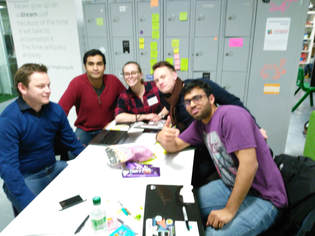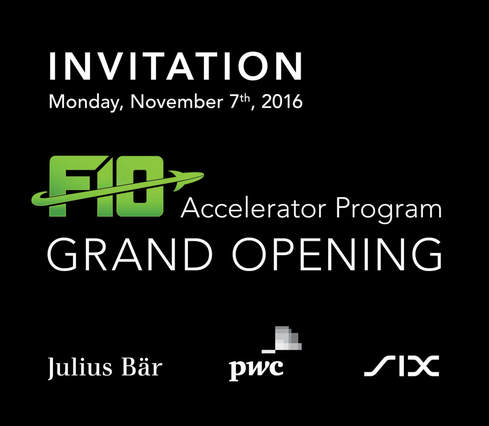|
Winning the Infosys Challenge highlighted shifts in the world of finance. Bizgees met at the UNICEF Fintech Jam for Good, 2016. We joined the first batch of F10 - Fintech Accelerator program in Zurich. We are currently working on our product / market fit. We are supporting Refugee Entrepreneurs access business level interest free micro financial services. This is our experience. Winning the Infosys Challenge was a great experience for the team. Under the high spirits we all felt we had stumbled onto something big. During the FinTech Jam weekend, we discovered segments of the global population are excluded. Over 2 billion people by some account are excluded from mainstream financial services. These excluded communities range from communities in rural areas in the developing world. To new emerging communities that come about due to displacement. We were hacking under the SVG title at the time. We decided to focus our attention on the displaced populations segment. Currently, they are over 60 million people who are displaced - the population the size of the UK / France. They have to leave behind their families, friends and ways of life due to conflict and climate change. The Syrian displacement is a popular experience on the news in most countries today. Ideation @ UNICEF FinTech Jam for Good There were two major constraints of the Infosys Challenge. Firstly, the identity of the target group had to be validated. Secondly, technology had to play a significant role. Claro partners supported the team with organising the UX Journey Design. This helped us select a segment of the population to focus on. Most of the communities would not qualify because access to technology was a key challenge for them. Then being able to verify their identities would be as difficult. Yet, sections of the displaced communities had their identities validated by UNHCR. Cases like UN Camps in Jordan are good examples. UNHCR has been using biometrics. They also issue these UN Registered Refugees with debit cards they top up every month. This allows for efficient flow of funds in near real time. The team also discovered in one UN Camp there is an informal economy of $11m a month. (Source: Cambridge University Study). None of the businesses there can access financial services of any kind. This touched us as a team. We felt here was a collection of people looking to take ownership of their own lives. Despite facing the hardships of displacement they wanted to empower themselves. But, these refugee entrepreneurs could not access basic support business support. For example, over 2,000 micro businesses exist there. Not one can access financial services like business insurances to protect their inventory. Growth finance, or even mainstream business banking. Our Original Team BizGees felt this would be ideal ground for alternative finance. Peer to peer finance would be a fitting way to get the supporters of refugees to engage with them in their hour of need. It would also allow the Refugees to lower their sense of isolation. A point to note here is that displacement generates psychological concerns as well. Engaging with people from other parts of the world who care can help overcome these concerns. BizGees felt peer to peer micro loans would be good way to orgainse this. It would support the refugee entrepreneurs scale their businesses. And, engage with people who care about them at the same time. These relationship may then become life long friendships. We settled on interest free micro loans as the best option. We felt the take up rates for interest free finance would be high. It would be culturally sensitive given most of the people in that UN Camp are Muslims. Innovate Finance invited us to their annual conference 2016. The team delivered their pitch and used the event to network. We were given VIP passes. We met the BBC and gave a radio interview. The venue - the Guildhall in the City of London had special significance for one of the members. He had previously served with the City of London Militia ( Honorable Artillery Company) . Historically, their role focused around protecting the Guild of the City of London. Next Steps The next step for BizGees was to decide whether to take this project forwards. As a team we felt conceptually there was merit in what they had come up with. So we should take it forwards. Now we were entering the chaos of the startup world. From here on life was a roller coaster ride. We applied to over 5 accelerator programs. We pitched 3 times before being accepted onto the F10 program. This took us 6 months to achieve. During this time, out of the 6 initial members from the FinTech Jam only 2 were left. During this time we did manage to onboard some key advisers. One adviser - Kilian Kleinschmidt - was an ex Deputy UNHCR Representative. He was a Senior Field Coordinator for UNHCR at the UN Camp they were looking to target in Jordan. The other specialised in Micro Chain - a version of blockchain we were looking to use. Francis Chen was the technical lead at MIT during his Master’s on the Micro Chain project. F 10 - FinTech Accelerator program The F10 - FinTech accelerator program was sponsored by Julius Baer, PWC & SIX. They were selecting only 10 startups to take part in their program. Competition was high. BizGees was the only project with a focus on social value and financial innovation. Upon selection we were invited to Zurich for the 6 month program. It gave us the time and space to translate the winning concept into a practical solution. For instance, during this time BizGees clarified its vision. We worked with Lars Diener-Kimmich - a local Swiss innovation professional. We organised our mission. We now support the host community as much as the Refugee Entrepreneurs. For instance, we managed to systemise our volunteer co workers base. Here we allow corporate professionals to support a cause dear to their hearts. They donot have to take away from their careers. This approach also allows the corporate professionals to up and re skill themselves. This gig economy based approach allows us to access expertise on a win/ win basis. We also have built an advisory team second to none. For example, we onboarded the MD of one of the world’s largest Social Impact VC’s Threshold Group in the US as an Adviser. Stephanie Cohn Rupp has over 17 years of impact investing experience. She has been co creating new knowledge with us. Her support ranges from them becoming investment ready to understanding the impact sector. Access to her black book has been helpful as well. A senior partner from a local Swiss law firm has been supporting us navigate the compliance concerns. Jana Essebier of Vischer also supported us on our trip to UN Camps in Jordan. Her introductions to local law firms in their network. We also worked with Oxford University Business School MBA’s to validate the project risks / return ratios. This helped us to identify and understand our weaknesses. From a product development point of view. BizGees managed to generate a specialist micro financial service for Refugee Entrepreneurs. Along the way we took a trip to Jordan along with their F10 Mentors. We met refugee entrepreneurs in Zaatri the UN camp in Jordan. This gave us a first hand insight into the lives of the refugees we were looking to support. Row of Micro Businesses run by Refugee Entrepreneurs inside Zaatari UN Camp Our MVP & Pivot BizGees now offer refugee entrepreneurs access to business in a box solutions. This supports refugees become successful entrepreneurs while adding value to their host countries. This pivotal change in direction took our supporters by surprise. BizGees felt it important to find a low risk point of entry into the market. So we changed geography from Jordan to Uganda. Here refugees have the right to work and experience a progressive environment. We also changed from peer to peer micro loans to micro franchise fee loans. This increased the impact of each loan was greater by factor of 3. The knock on impact / multiplier effect is also greater. For instance, the training the refugees receive helps them understand how to organise a business. How to engage with clients? How to manage inventory? How to organise business records? 6 month of business mentoring as well. We will be returning to Jordan, just later in our growth cycle. All this occurred in less than two months. This approach helps BizGees support the host country at the same time. So, the bang for the buck goes up several fold. For instance, we now organise credit records for all the entrepreneurs working with Wessex Social Ventures. All the micro entrepreneurs get to build up a business level identity allowing them to enter the mainstream financial system. This is a positive externality we generate through our daily operations. This also allows BizGees to act as a feeder to other financial institutions. For example, Kilian is now part of a SME bank ( still a work in progress ). He has the backing of a sovereign wealth fund to support SME’s in rural areas in the developing world. Another example are the UN Development goals that get supported along way. Each business in a box solution necessarily supports at least 5 of the 17 UN Development goals at the same time. Where from here? So as you can see we have come long way in 15 months from the UNICEF FinTech Jam for Good. We are now capitalising on the growth in alternative finance. We also generating new forms of interest free business level micro financial services. We are looking to meet financial institutions to discuss sharing our innovation on a win/ win basis. This blog was recently posted by Innovate Finance as a two part blog. Part 1 and Part 2 .
0 Comments
Leave a Reply. |





 RSS Feed
RSS Feed

